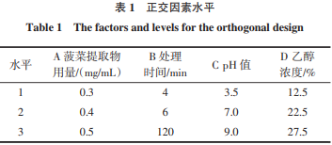澳大利亚为250mg/L~300mg/L
二氧化硫或其衍生物(亚硫酸盐、菠菜焦亚硫酸盐、提取萄酒亚硫酸氢盐)被广泛地应用于葡萄的物去采摘、酿制过程中,除葡以起到保鲜、中亚杀菌、硫酸抗氧化、盐的研究稳定的菠菜作用。从古代起,提取萄酒人们便使用硫磺来为葡萄酒杀菌。物去欧盟法律规定干红葡萄酒中SO2的除葡总量上限为160mg/L,干白和桃红葡萄酒中SO2的中亚含量上限为210mg/L,澳大利亚为250mg/L~300mg/L,硫酸新西兰为250mg/L~400mg/L。盐的研究美国食品药品监督管理局(FoodandDrugAdministration,菠菜FDA)规定当葡萄酒中亚硫酸盐含量超过10mg/L时,必须在标准中予以标明。我国对二氧化硫作为葡萄酒的添加剂,在使用量上也有严格的规定,作为添加剂的使用最高值为250mg/L,二氧化硫残留量不得超过50mg/L。我国有机葡萄酒GB/T19630—2011《有机产品》中规定,红葡萄酒的最大使用量为100mg/L,白葡萄酒、桃红葡萄酒二氧化硫最大使用量为150mg/L。
葡萄酒中添加SO2,不但会影响葡萄酒的风味,而且也对人体健康不利,尤其对过敏体质者和哮喘病人会诱发一些身体问题联合国粮食与农业组织和世界卫生组织联合食品添加剂专家委员会制定的SO2安全摄入限量是每天每千克体重0.7mg。对于一个60kg的成年人,相当于每天摄入量不能超过42mg。针对葡萄酒中亚硫酸盐的危害问题,Brown利用离子交换树脂来吸附葡萄酒中的亚硫酸盐,而Seifter等则采用含固定氧化剂的膜来去除葡萄酒中亚硫酸盐,这两种方法都能使葡萄酒中的亚硫酸盐降到0.01mg/mL以下,但是由于其作用机制的非选择性,结果会造成葡萄酒中一些成分的损失,从而影响葡萄酒的质量。Lin等利用从麦苗中提取的叶绿体对葡萄酒中的亚硫酸盐清除情况进行了研究,结果发现该方法能够有效地除去葡萄酒中的亚硫酸盐,但是需要将葡萄酒的pH值调至8.5时,去除效率最好,而且该方法对白葡萄酒的处理效果要好于红葡萄酒,同时发现光照对去除效果有一定的促进作用,显然该方法存在一定缺陷。
亚硫酸盐氧化酶能够专一性将亚硫酸盐氧化成硫酸盐,但是由于这种酶的复杂性,目前还未有商业化生产。叶绿体作为一种天然的生物催化剂,存在于绝大多数的绿色植物叶片中。叶绿体在一定条件下通过代谢途径对低浓度的亚硫酸盐溶液具有良好的氧化并脱除的效果。本研究对从新鲜菠菜中提取的叶绿体内含物进行了改进,并对改进后的菠菜提取物去除葡萄酒中的亚硫酸盐情况进行研究。
1 材料与方法
1.1 原料
红葡萄酒、白葡萄酒:烟台张裕葡萄酒有限公司;亚硝酸钠、氢氧化钠、氯化钠、乙二胺四乙酸(ethylenediaminetetraaceticacid,EDTA)、过氧化氢(以上试剂均为分析纯):国药集团化学试剂有限公司。
ME204T/02电子天平:梅特勒-托利多公司;H1650-W台式离心机:湖南湘仪离心机有限公司;101型真空干燥机:北京市永光明医疗仪器厂。
1.2 菠菜提取物的制备
选取新鲜的嫩菠菜叶,洗净,擦干后去除叶梗,用高速组织破碎机破碎成匀浆,6层纱布过滤除去粗纤维,所得滤液于4℃、10000r/min离心10min,收集含叶绿体的内容物(线粒体、溶酶体、微体)的沉淀,真空干燥、复配、密封、干燥处保藏、备用。
1.3 葡萄酒中二氧化硫的测定
按照国标GB/T15038—2006《葡萄酒、果酒通用分析方法》中SO2的测定方法进行测定。
1.4 葡萄酒中二氧化硫去除单因素试验
分别取50mL葡萄酒置于250mL的三角瓶中,然后测定菠菜提取物在不同使用量、处理时间、pH值和酒精度等各种条件下二氧化硫的去除情况。其中,试验过程中葡萄酒pH值的调整用0.1mol/L的氢氧化钠进行,除非特别说明,所有试验均在25℃室温条件下进行。
1.5 葡萄酒中二氧化硫去除正交试验
在葡萄酒中二氧化硫去除单因素试验的基础上进行正交试验设计,选取菠菜提取物用量0.3、0.4、0.5mg/mL;处理时间4、6、120min;pH值3.5、7.0、9.0;和乙醇浓度12.5%、22.5%、27.5%,为自变量,以1、2、3水平进行编码,以总二氧化硫清除率为响应值进行四因素三水平试验设计,试验因素和水平设计见表1。

1.6 去硫葡萄酒的感官评价
葡萄酒的感官品质包括葡萄酒的外观、香气、滋味以及是否具有典型性,因酒龄、品种、种植条件的不同,葡萄酒带给人的感觉也千变万化,本研究对去除二氧化硫后的葡萄酒进行感官评定,感官评分标准如表2所示。


1.7 数据处理
所得数据利用正交设计助手II和SPSS21.0软件进行单因素方差分析,P>0.05为差异不显著;P<0.05为差异显著;P<0.01为差异极显著。
声明:本文所用图片、文字来源《食品研究与开发》,版权归原作者所有。如涉及作品内容、版权等问题,请与本网联系
相关链接:菠菜,生物成分分析标准物质-菠菜,二氧化硫,乙二胺四乙酸